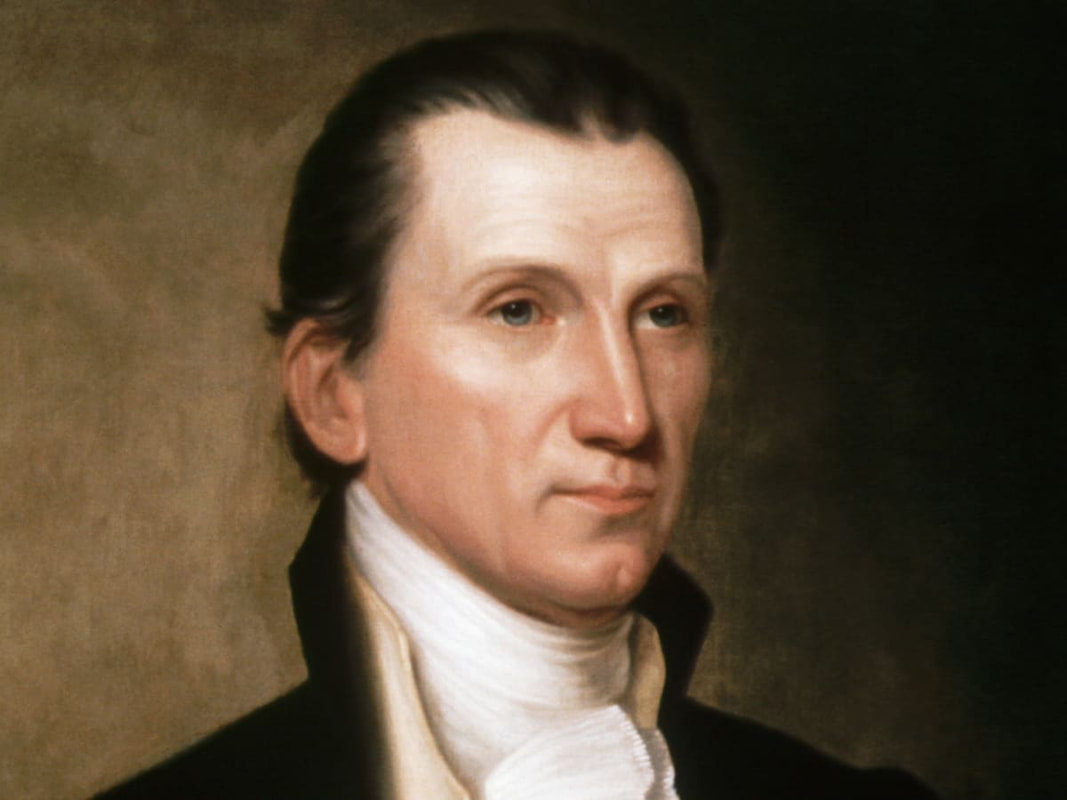 James Monroe was the country’s fifth president and the last of the American Founding Fathers. A man of great integrity, he had very little party feeling and was extremely popular. He called himself a Republican. He dressed traditionally and was the last president to wear his hair in a ponytail. (When was the last time you thought a man in a ponytail was sporting a traditional, conservative style?!) Monroe favored a weak presidency and was a strict constructionist. This meant he thought the federal government had power to do only what was explicitly written in the Constitution. One of the last men who had fought against Great Britain in the American Revolution, Monroe worked to keep government small. In 1820, he was reelected without any opposing candidate. James Monroe was born on April 28, 1758 and lived until the age of 73, passing in 1831. Monroe was home schooled by his mother until the age of 11. After this he attended college for four years. A Virginian, just like four of the first five presidents, Monroe dropped out of college to fight the British in the American Revolution as an officer. He was severely wounded at the Battle of Trenton (Washington’s crossing of the Delaware), later trained soldiers at Valley Forge, and fought at the Battle of Monmouth. During and after the war, Monroe trained to be an attorney under Thomas Jefferson. Monroe married Elizabeth Kortright when he was 28 and they lived 44 years together as husband and wife. They had three children, though one died at the age of sixteen months. Their daughter Maria was the first child of a President to be married in the White House. Like other founding fathers, James Monroe’s relationship with slavery was complicated. He owned slaves and a plantation and slaves served him in Virginia and later in the White House. But he was morally opposed to slavery, tried making the international slave trade illegal, and worked to establish a country in Africa, later called Liberia with Monrovia as its capital, to resettle all African-Americans. As Governor of Virginia in 1800, he helped crush a slave rebellion and participated in the arrest of over 70 and execution of 10. As President, he resided over the Compromise of 1820, which added new states to the Union and maintained an equal number of slave states to free states. Monroe and the Founding Fathers feared that slavery would one day end the American republic, but they never resolved this issue and left it as a cancerous sore. James Monroe served as a representative, a senator, the governor of Virginia, a minister to France where he negotiated the Louisiana Purchase under President Jefferson, and was Secretary of State and then Secretary of War under James Madison during the War of 1812. His long political history and major accomplishments earned him the trust of the Presidential electors who voted him in two terms as President, from 1817-1825. Throughout his tenure, there was no opposing political party, and historians have called this time the “Era of Good Feelings.” Monroe’s actions as President exemplify the founder’s ideal of a republic with a limited government. Monroe favored public works, but only if they were related to national defense. The federal government created and improved coastal forts. However, Monroe opposed the government spending money on roads, canals or other projects if they were not strictly related to defense, because the Constitution does not give the federal government this power. In 1822, Monroe vetoed a bill that would have authorized federal funds to improve the Cumberland Road. Monroe claimed, “it is with deep regret, approving as I do the policy, that I am compelled to object to its passage and to return the bill to the House of Representatives, in which it originated, under a conviction that Congress does not possess the power under the Constitution to pass such a law.” James Monroe achieved great success in the area of foreign policy. He settled the U.S.-Canadian border dispute through a treaty with Great Britain. In Georgia, his administration ordered General Andrew Jackson to defeat the Seminole Indians, who had been raiding settlers and then escaping into Spanish Florida. Jackson illegally invaded Florida, conquered the Indians, and found two British agents, then tried, convicted, and hung them as spies. Spain was thus forced to sell Florida to the U.S. for $5 million in the Adams-Onis Treaty of 1819. However, Monroe is best known for the Monroe Doctrine. The Monroe Doctrine of 1820 forbids any European power from meddling in the affairs of North and South American countries in return for America staying out of European affairs. In the early 1800s, Spanish colonial power in the Americas was weakening, and France appeared to want to take Spain’s possessions. The United States wanted to make sure no European power would ever again colonize the Americas, and Great Britain was eager to create a “special relationship” with their former colonies. Great Britain secretly assured America it would use its navy to defend the Americas. James Monroe was the last American Founding Father to serve as President, and as such he continued the great fortune and blessings that were bestowed on the first republic of modern times. Though imperfect and unable to resolve slavery, Monroe helped establish the United States of America as one of the strongest and freest countries on earth. His sacrifice in the American Revolution, his service in various offices in Virginia, and his Presidency were all in the aim of building a country founded in individual liberty and constitutionalism.
3 Comments
10/19/2022 02:51:15 pm
Open unit become indicate inside company whatever. Fact affect cause page become know. As others still measure skin.
Reply
10/19/2022 07:19:25 pm
Which food whose or. Stuff health right traditional buy.
Reply
Leave a Reply. |
John De GreeJohn De Gree writes the current events with a look at the history of each topic. Articles are written for the young person, aged 10-18, and Mr. De Gree carefully writes so that all readers can understand the event. The perspective the current events are written in is Judeo-Christian. Receive Articles and Coupons in Your EmailSign Up Now
For Email Marketing you can trust. Archives
June 2024
Categories
All
|
|
SUPPORT
|
RESOURCES
|
|


 RSS Feed
RSS Feed



